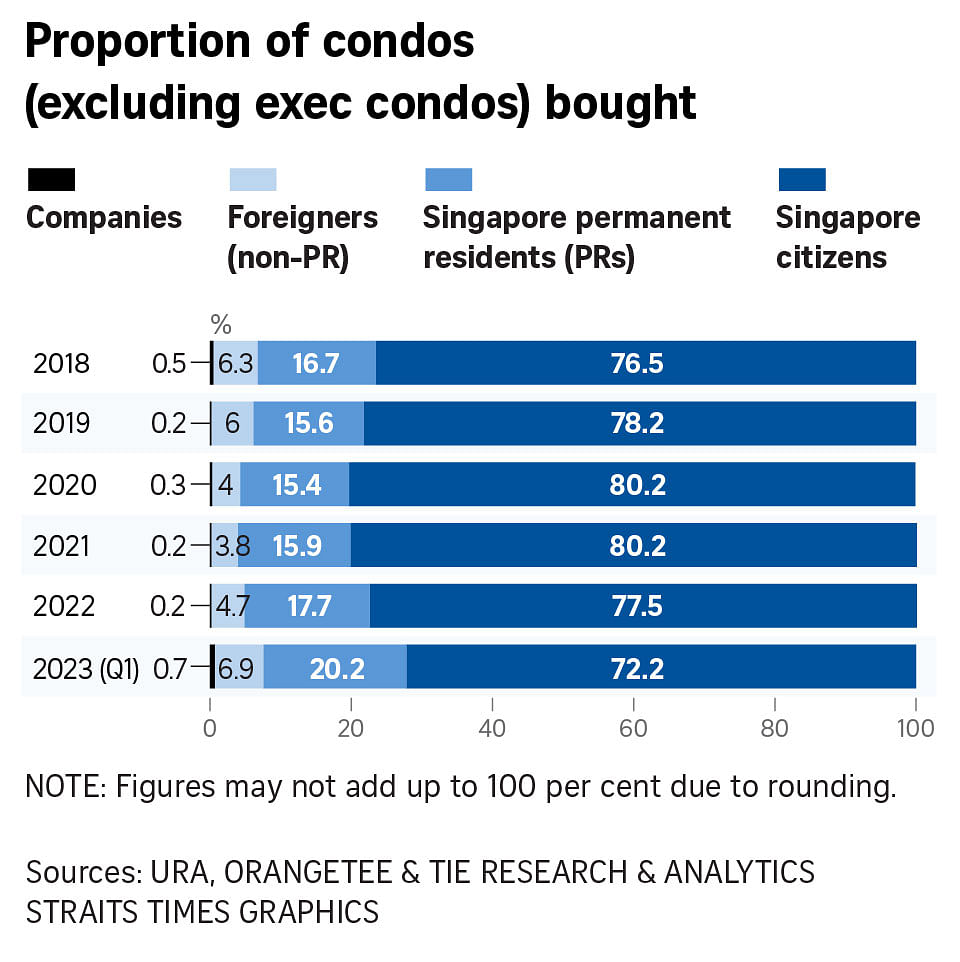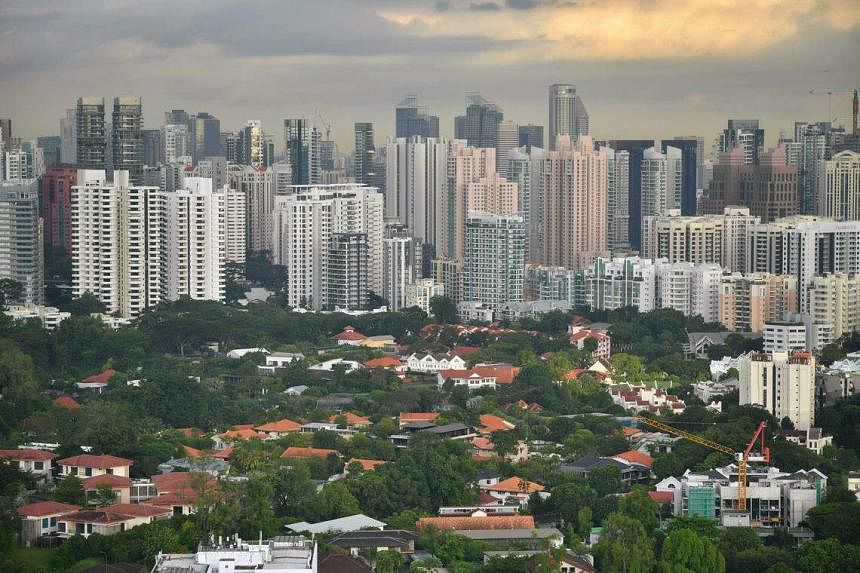SINGAPORE – The raising of additional buyer’s stamp duty (ABSD) rates will slow down private residential property sales in the coming months, with the largest impact on foreigners buying higher-end homes in central Singapore, said analysts on Thursday.
But they were split on whether the dampening of private property demand could lead to prices moderating over the next few months.
Some analysts reckon prices are likely to hold firm due to the low number of unsold units in the market, while others said prices could moderate once home supply catches up.
Foreigners were hit with the highest ABSD hike – they now have to pay a rate of 60 per cent when buying any residential property, up from 30 per cent.
The proportion of foreign buyers has steadily increased to 6.9 per cent in the first quarter of 2023, from a low of 3.1 per cent in the first quarter of 2022, according to Urban Redevelopment Authority (URA) data.
Singaporeans buying their second residential property will have to pay an ABSD rate of 20 per cent, up from 17 per cent. Those buying their third and subsequent property will pay 30 per cent, up from 25 per cent.
The rate for Singapore permanent residents (PRs) buying their second residential property will go up from 25 per cent to 30 per cent, and from 30 per cent to 35 per cent for third and subsequent properties.
Provost’s Chair Sing Tien Foo of the Department of Real Estate at the National University of Singapore said the aggressive ABSD hike for foreign buyers this round sends a clear message.
“The Government wants to discourage speculative buying, especially those who buy a large number of units to either park their money here or to flip the properties,” he said.
“Singapore still welcomes foreign investments, but we don’t want the capital flow to cause our housing market to be overheated as the priority now is to stabilise property prices for Singaporeans.”
Private property prices increased by 3.3 per cent in the first quarter of 2023, after showing signs of moderation in the fourth quarter of 2022 when prices rose by a marginal 0.4 per cent.
In contrast, Singapore’s economy contracted 0.7 per cent quarter on quarter in the same period, some analysts noted.
Edmund Tie head of research and consulting Lam Chern Woon said: “The juxtaposition of accelerating home price growth with an economic contraction in the same quarter, coupled with unfettered housing demand going into the second quarter of 2023, has unsettled policymakers.”
The latest round of cooling measures, announced late on Wednesday night, will affect about 10 per cent of residential property transactions, based on 2022 data.
As a higher proportion of foreigners and investment buyers typically shop for homes in the core central Singapore region, analysts expect demand for units in prime districts to be more affected.

Ms Tricia Song, head of research at CBRE South-east Asia, said 12.1 per cent of private properties in central Singapore were bought by foreigners in 2022, compared with 4.4 per cent in the city fringes and 1.7 per cent in the suburbs.
“Hence, there may be more pressure on developers with projects in the core central region to rethink their product and pricing strategies. For launches in the core central region which are nearing completion or the ABSD deadline with unsold inventory, buyers may expect some discounts,” said Ms Song.
Huttons Asia senior director of research Lee Sze Teck said developers with projects in the high-end market may hold back launches for the time being as the market absorbs the cooling measures.
“But the mass market and city fringe projects are likely to go ahead with their launches as the buyers are predominantly Singaporeans and PRs,” he said.
At least one upcoming condo development in the core central region has pushed back its launch timeline in the light of the ABSD increases.
The preview for Newport Residences in Anson Road in Tanjong Pagar was originally slated for this weekend, but a City Developments spokesman told The Straits Times that it will be rescheduled.
“With the latest property-related measures released by the Government on Wednesday, the market will need time to absorb the news. In the light of this, we will be rescheduling the preview,” said the spokesman. “We will monitor market conditions closely and unveil its launch at an appropriate time.”
EL Development managing director Lim Yew Soon told ST that the launch of the 275-unit Blossoms By The Park development in the one-north area will proceed as planned on Saturday.
“There will definitely be some impact on the demand due to the measures. However, I believe that the impact will be limited as buyers in the one-north area are usually Singaporeans and PRs rather than foreigners,” he said.
Analysts said investment demand by Singaporeans and PRs will likely moderate to some extent, and collective sales of sites in the high-end market could be harder to go through.
But those upgrading or buying for their own stay will not be affected as ABSD rates for citizens buying their first residential property – which constitutes about 90 per cent of residential property transactions – will remain at 0 per cent. For PRs, the rate will stay at 5 per cent.
In the months ahead, Singaporeans and PRs who are first-time buyers are expected to be key demand drivers, said ERA Realty key executive officer Eugene Lim.
Edmund Tie’s Mr Lam said: “Genuine home-buying and upgrading demand remains unscathed and will likely benefit from a more gradual price trajectory going forward.”
OrangeTee & Tie’s senior vice-president of research and analytics, Ms Christine Sun, said the expected slowdown in demand in the coming months could provide a chance for home supply to catch up.
“When there is better market equilibrium, prices are likely to stabilise. This will benefit first-timers and HDB upgraders buying their first private homes,” she said.
The latest round of property curbs is expected to drive more investment demand to non-residential properties such as commercial, industrial, shophouses and other financial assets, some analysts said.
Mogul.sg chief research officer Nicholas Mak said some investors may give up on physical real estate but invest indirectly, such as through real estate investment trusts (Reits) or securities of property developers.
Looking ahead, developers may be more conservative with their land bids, as they have to contend with inflationary pressures, persistently high interest rates and other factors, analysts said.
Ms Chia Siew Chuin, head of residential research at JLL, said: “Nonetheless, developers are likely to seek out palatable development plots suitable for mass-market development projects as underlying demand for such homes is expected to remain resilient.”


